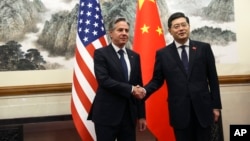How reporters were expected to behave while in China covering U.S. Secretary of State Antony Blinken's trip was spelled out in advance: The Chinese side did not want anyone shouting questions.
Ahead of covering the camera sprays of Blinken’s meeting with Chinese Foreign Minister Qin Gang on Sunday, U.S. journalists were told that if any member of the U.S. traveling press decided to shout questions, they would be kicked out of the media availability immediately. They could also end up being denied a visa for future reporting trips to mainland China.
Not shouting questions is standard practice for reporters working in China, but it is a dramatic change from the United States, where journalists routinely yell out questions to senior U.S. officials in public.
The Beijing government has not granted a visa to a Voice of America journalist to cover news in China since 2020. As I traveled with Blinken to cover his Beijing meetings, authorities made an exception for me.
Digital security
For security reasons, I was instructed to bring different iPhones and a spare laptop to use while on the ground in China.
Journalists were also encouraged not to leave laptops in their hotel rooms. During previous trips, members of the U.S. delegations reported having their electronic devices accessed while they were out of their Beijing hotel rooms.
China’s massive internet firewall blocks many non-Chinese apps and websites, including Gmail, many VOA webpages, and other news and government websites. So I had to install a reliable VPN to maintain access to communication tools.
Blinken’s 35-minute meeting with Chinese President Xi Jinping at the Great Hall of the People on Monday was the highlight of his trip. It was not formally announced until less than one hour before the two officials met. Media access to film their handshake was even more restricted: Only one U.S. TV producer and one still photographer were allowed to cover it.
The scene of Blinken’s other meetings was Beijing’s Diaoyutai State Guesthouse, a diplomatic complex where China’s leaders often receive foreign delegations and security is extremely tight. U.S. press covering the camera sprays were scrutinized by security personnel and were asked to show passports at least three times within the perimeter. No standups are permitted inside the compound.
An attempt to mend ties?
For all of the restrictions and security, there were also some friendlier interactions that pointed to efforts to stabilize the bilateral relationship.
On Sunday, Qin Gang walked to the entrance of the meeting venue, waiting to greet Blinken. It was seen as a warm gesture since Qin usually stands at the flags position inside the room, waiting for foreign dignitaries to come to him for handshakes and photos, according to a local reporter.
On Monday afternoon, Blinken announced Qin was invited to Washington on a reciprocal visit.
“To continue dialogue on these and other important issues, I would expect additional visits by senior U.S. officials to China over the coming weeks. And we welcome further visits by Chinese officials to the United States,” said Blinken during a solo press conference in Beijing.
The diplomatic results from Blinken’s long-delayed trip were still unclear as he left the country, but if both sides pull off reciprocal visits in the coming months it will count as an improvement in ties that have been under severe strain for years.




